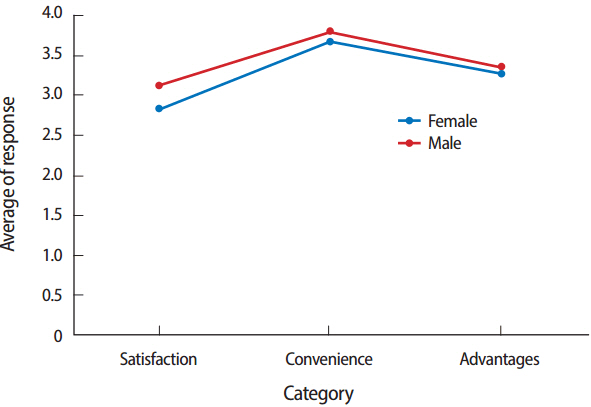J Educ Eval Health Prof.
2017;14:7. 10.3352/jeehp.2017.14.7.
Smart device-based testing for medical students in Korea: satisfaction, convenience, and advantages
- Affiliations
-
- 1Division of Educational Evaluation, Korea Institute for Curriculum and Evaluation, Seoul, Korea.
- 2Research and Development Division, Korea Health Personnel Licensing Examination Institute, Seoul, Korea.
- 3Department of Parasitology and Institute of Medical Education, Hallym University College of Medicine, Chuncheon, Korea. shuh@hallym.ac.kr
- KMID: 2406670
- DOI: http://doi.org/10.3352/jeehp.2017.14.7
Abstract
- The aim of this study was to investigate respondents' satisfaction with smart device-based testing (SBT), as well as its convenience and advantages, in order to improve its implementation. The survey was conducted among 108 junior medical students at Kyungpook National University School of Medicine, Korea, who took a practice licensing examination using SBT in September 2015. The survey contained 28 items scored using a 5-point Likert scale. The items were divided into the following three categories: satisfaction with SBT administration, convenience of SBT features, and advantages of SBT compared to paper-and-pencil testing or computer-based testing. The reliability of the survey was 0.95. Of the three categories, the convenience of the SBT features received the highest mean (M) score (M= 3.75, standard deviation [SD]= 0.69), while the category of satisfaction with SBT received the lowest (M= 3.13, SD= 1.07). No statistically significant differences across these categories with respect to sex, age, or experience were observed. These results indicate that SBT was practical and effective to take and to administer.
MeSH Terms
Figure
Cited by 3 articles
-
Journal Metrics of
Infection & Chemotherapy and Current Scholarly Journal Publication Issues
Sun Huh
Infect Chemother. 2018;50(3):219-227. doi: 10.3947/ic.2018.50.3.219.Presidential address: Preparing for permanent test centers and computerized adaptive testing
Chang Hwi Kim, Sun Huh
J Educ Eval Health Prof. 2018;15:1. doi: 10.3352/jeehp.2018.15.1.The relationship of examinees’ individual characteristics and perceived acceptability of smart device-based testing to test scores on the practice test of the Korea Emergency Medicine Technician Licensing Examination
Eun Young Lim, Mi Kyoung Yim, Sun Huh, A Ra Cho
J Educ Eval Health Prof. 2018;15:33. doi: 10.3352/jeehp.2018.15.33.
Reference
-
References
1. Kim CH. Presidential address: introduction of smart device-based testing and item exposure policy for Korea Health Personnel Licensing Examination. J Educ Eval Health Prof. 2017; 14:5. https://doi.org/10.3352/jeehp.2017.14.5.
Article2. Kwon OY, Rhee SY, Choi JM, Kim YS. Usefulness of ubiquitous-based testing for evaluations in medical education. Korean J Med Educ. 2015; 27:3–10. https://doi.org/10.3946/kjme.2015.27.1.3.
Article3. Roh H, Lee JT, Rhee BD. Ubiquitous-based testing in medical education. Med Teach. 2015; 37:302–303. https://doi.org/10.3109/0142159X.2014.956070.
Article
- Full Text Links
- Actions
-
Cited
- CITED
-
- Close
- Share
- Similar articles
-
- Evaluation of usefulness of smart device-based testing: a survey study of Korean medical students
- Usefulness of ubiquitous-based testing for evaluations in medical education
- The relationship of examinees' individual characteristics and perceived acceptability of smart device-based testing to test scores on the practice test of the Korea Emergency Medicine Technician Licensing Examination
- Study on Eating Habits and Dietary Quality according to Time Spent Using Smart Devices among Middle School Students in Incheon
- Medical students’ self-assessed efficacy and satisfaction with training on endotracheal intubation and central venous catheterization with smart glasses in Taiwan: a non-equivalent control-group pre- and post-test study


